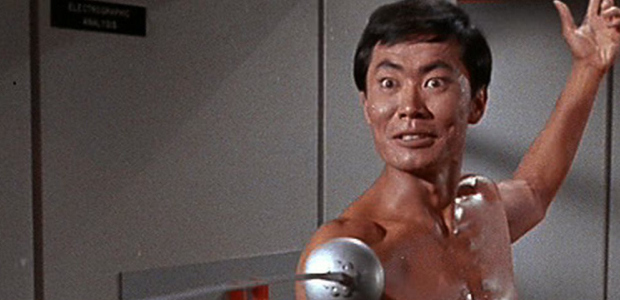George Takei's impact on our world is difficult to succinctly summarize. Of course there are generations of science fiction fans who know him as occasionally swashbuckling and shirtless Sulu in the original Star Trek series (and subsequent string of films). Then there's a new wave of fans who've come to know him as "Uncle George," a social-media maverick who boasts more than 1.32 million Twitter followers and 7.4 million Facebook friends. But aside from being a statesman of sci-fi and king of memes, George Takei has also made a name for himself as an advocate, first for the rights of Japanese-Americans, then for the rights of the LGBT community. The documentary To Be Takei aims to capture each of these elements of George Takei's public persona, while giving an in-depth look at his personal life with husband, Brad Takei né Altman. It's a lot to take on, but director Jennifer M. Kroot delivers something that is as profound as it is funny and uplifting.
At first, it seems To Be Takei might be a standard "get to know a celeb" doc, the kind that is superficial and fawning. We're invited into the home of George and Brad, and walked through George's formative moments. Takei devotees know that these include not only his first brushes with fame but also his recollections of being interned during the height of World War II paranoia. The harrowing realities of internment are studded throughout To Be Takei, and soon Jennifer M. Kroot begins to shape Takei's story into one of personal revolution writ large. Each anecdote contributes to the portrait of a man of great heart and great perseverance, hinting to his next great battle and ours.
George speaks openly and eloquently about how the U.S. government stripped his family--along with 110,000 other Japanese Americans--of their rights, homes and businesses, and threw them into a prison until they could prove themselves suitably loyal to the United States. It's a stain on our history that has become too easy to ignore. But Takei won't let us forget, as well he shouldn't, lest its hard-won lessons be lost.
Kroot punctuates Takei's political awakening to activism on behalf of the survivors of this horrendous internment. From there, she draws a clear parallel between the civil rights of formerly alienated Japanese-Americans and the LGBT community that now faces a battle for rights to marry, adopt, and be seen by the law as the same as their heterosexual peers. But as the narrative zings about in its chronology, Kroot keeps things light by bouncing from a tragic memory of internment to one of Takei's many career highlights, or winsome banter between he and Brad. To Be Takei allows us to relive Takei's coming out and subsequent activism, which included comedy bits that mocked homophobes and invited his own last name to become a synonym for "gay."
But To Be Takei's most radical move is to simply show George and his husband as they are, a happily married couple.
We're allowed a cozy intimacy with the pair. We see them at ease with each other, with Brad wordlessly demanding snacks by wiggling his fingers to a French fries-holding George. We see them bicker when George gets a bit too frank about their sex lives on Howard Stern's radio show. We see them rejoice at their wedding, surrounded by friends and family. We see them mourn the loss of their mothers. We see how they are like so many other married couples we know. They are just also gay.
Essentially, To Be Takei is an invitation to get to know and understand not only George Takei, but also George and Brad Takei. The Takeis. The married couple who have known each other for decades, stood by each other through highs and lows, and who still have to prove their relationship is valid in the majority of American states.
While this doc tackles disturbing themes of social injustice, racism and homophobia, it's an overall joyous watch. Like its titular hero, To Be Takei is so infused with warmth, jubilance and fun, that it can deliver a political message in a non-threatening, earnest, and entertaining manner. Its structure seems a bit tangential. As Takei's persona and impact sprawls out not just across pop culture but also in the realms of representation for Asians and gays, it can feel like Kroot took on a topic too big for a single documentary. But for anyone who has only known Takei for one or two of the many roles he's had in creating our current zeitgeist, To Be Takei should be a welcomed introduction to the man and his message of inclusion and love.
Ultimately, To Be Takei is radiant with the joy of the man has captured the hearts and imaginations of untold fans. It left me smiling ear to ear, and with some serious food for thought. The doc is more than a charming look into the life of a charismatic and eccentric celebrity. It's a political call to action in the most affable way possible.
Staff writer at CinemaBlend.












